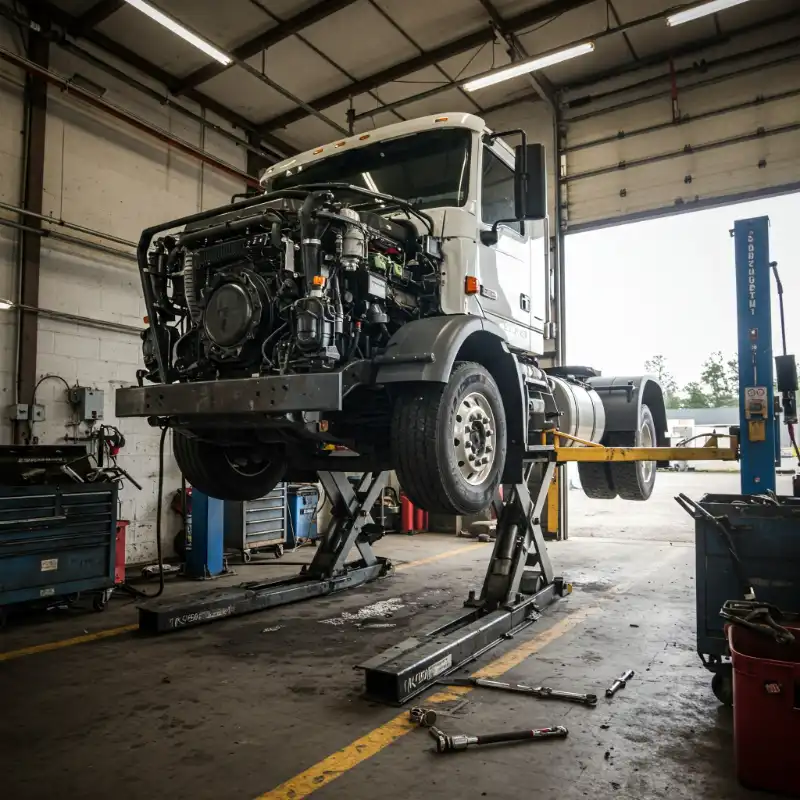The HVAC system is your reliable companion, shielding you from the elements on the road. However, like any dependable ally, it requires regular attention and care to keep performing at its best. We have gathered invaluable tips and essential knowledge to help you maintain and repair your heavy-duty truck's air conditioning systems effectively.
Tips for Maintaining and Repairing Air Conditioning Systems
Tip 1: Regular Maintenance Checks
Regularly inspect your truck's air conditioning system. Check for leaks, loose connections, or worn-out components. Catching potential issues early on can prevent major breakdowns and ensure a consistent flow of cool air during your trips.
Tip 2: Clean and Replace Filters
Filters play a vital role in maintaining the quality of air circulating within your cabin. Clean or replace them as recommended by the manufacturer to ensure efficient airflow and a well-functioning HVAC system.
Tip 3: Professional Servicing
Periodically engage certified technicians to conduct thorough inspections and servicing of your HVAC system. Their expertise can identify and address underlying problems that might not be apparent during routine checks, ensuring your system operates optimally.
Tip 4: Monitor Coolant Levels
Regularly check and maintain appropriate coolant levels in your air conditioning system. Proper coolant levels are vital for effective heat absorption and maintaining an efficiently functioning HVAC system.
Tip 5: Protection from the Elements
When your truck is not on the road, provide a covered parking space or garage to shield it from extreme weather conditions. This protective measure can extend the life of your air conditioning system, saving you from costly repairs.
How Do Commercial Truck Air Conditioning Systems Work?
Understanding the mechanics behind your commercial truck's air conditioning system is fundamental to its upkeep. The HVAC system in a commercial truck operates on the principle of refrigeration. A special refrigerant circulates through various components of the system, changing from gas to liquid and back, facilitating the cooling process.
The compressor plays a vital role, compressing the refrigerant into a high-pressure gas. This high-pressure gas then moves through the condenser, transforming into a high-pressure liquid. The liquid passes through an expansion valve, converting it into a low-pressure liquid. This liquid enters the evaporator, absorbing heat from the cabin air and turning back into a gas. A blower pushes this cooled air into the cabin, ensuring a comfortable driving experience, no matter the weather outside.
Air Conditioning Repairs or Services for Heavy-duty Trucks
Leak Detection and Repair
Regularly inspect for leaks in the HVAC system. Leaks can cause a drop in cooling efficiency and potentially harm the environment due to refrigerant leakage. Prompt detection and repair of leaks can save you from more significant issues in the future.
Compressor Replacement
The compressor is a critical component of the air conditioning system. If you notice uneven cooling or hear unusual noises coming from the compressor, it might be time for a replacement. A well-functioning compressor ensures your system operates at peak efficiency.
Evaporator and Condenser Cleaning
Dust and debris can accumulate on the evaporator and condenser coils, affecting the cooling efficiency. Regular cleaning of these components helps maintain optimal airflow and cooling performance, reducing strain on your air conditioning system.
Fan Motor Replacement
The blower fan's motor is responsible for circulating air within the cabin. If you experience reduced airflow or an unresponsive fan, it's advisable to replace the fan motor to ensure consistent air circulation and efficient cooling.
Click here for more information on our HVAC repairs and services!
Different Types of Air Conditioning Units
Here's an overview of the different types of heavy-duty truck air conditioning systems:
- Engine-Driven Air Conditioning Systems: These systems utilize the truck's engine to power the air conditioner. The engine's power is harnessed to drive the compressor, providing cooling for the cabin. Engine-driven systems are robust and often found in larger commercial trucks.
- Electric Air Conditioning Systems: Electric air conditioning systems are powered by the truck's electrical system or auxiliary power units (APUs). They offer a quieter and more fuel-efficient alternative to engine-driven systems, making them increasingly popular among truck owners.
- Self-Contained Air Conditioning Units: These compact units are separate from the truck's main engine and provide localized cooling for the cabin. They can be mounted on the truck's roof or at the back of the cab. Self-contained units are versatile and suitable for various truck sizes and configurations.
- Hybrid Air Conditioning Systems: Combining the advantages of engine-driven and electric systems, hybrid air conditioning systems offer flexibility. They can operate using the truck's engine or switch to electric power when the engine is off, providing cooling during rest breaks.
- Split Air Conditioning Systems: Split systems consist of two main components: an evaporator inside the cabin and a condenser typically mounted on the truck's exterior. They offer efficient cooling and are commonly used in heavy-duty trucks with sleeper cabs.
Summary
Maintaining and repairing your heavy-duty truck's air conditioning system is a proactive step toward ensuring a comfortable and stress-free journey on the road. By adhering to regular maintenance, addressing repairs promptly, and understanding how the HVAC system operates, you can optimize the performance and longevity of your truck's air conditioning. Remember, a well-maintained HVAC system not only keeps you cool but also protects your investment. Safe travels, and may your HVAC system always deliver a breeze of refreshing air during your adventures!










.webp)





























